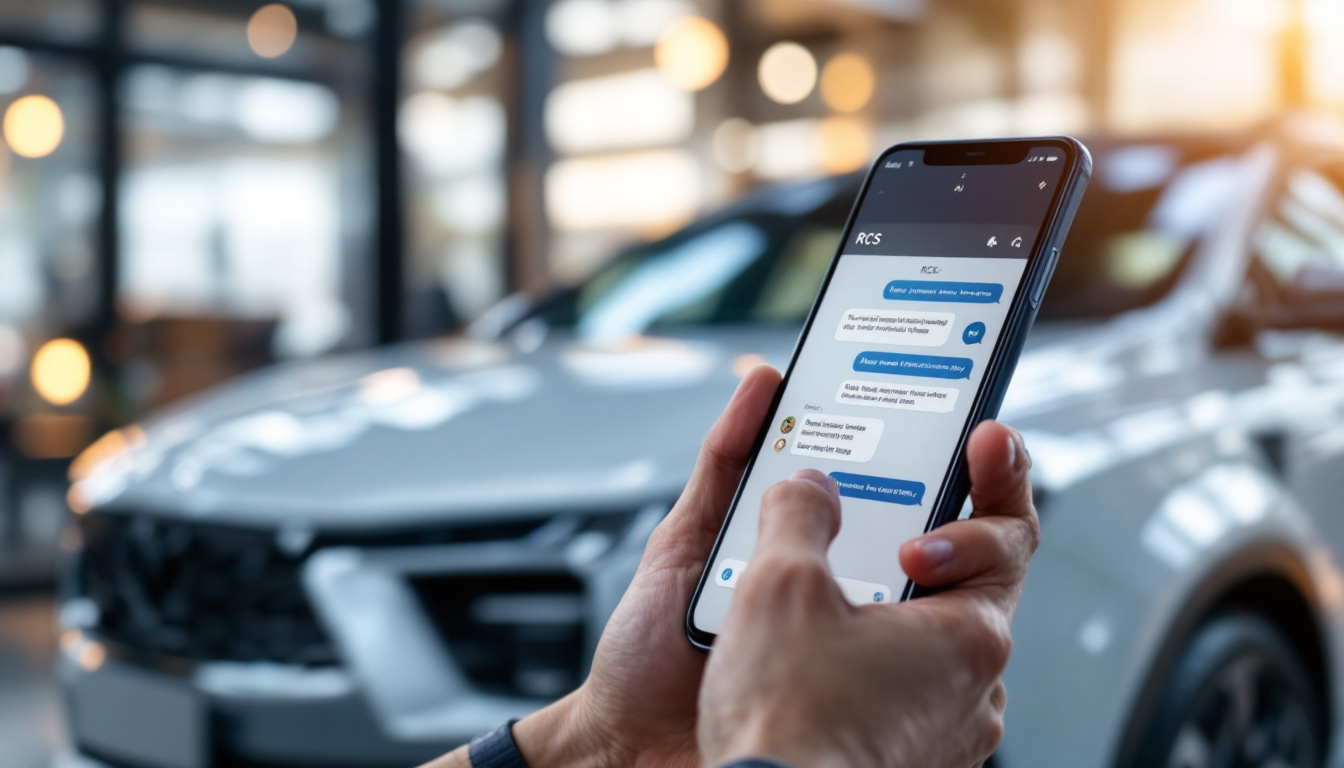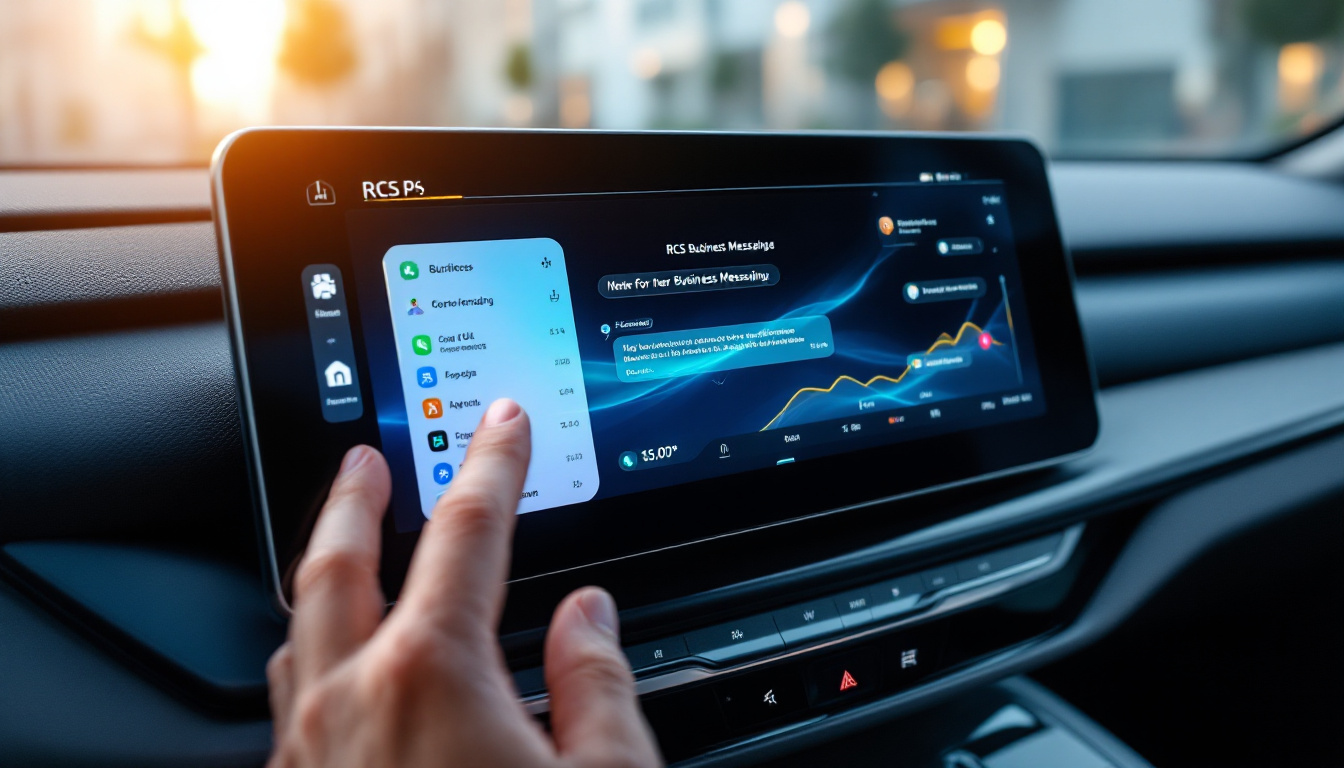In the ever-evolving landscape of automotive marketing, businesses are continuously seeking innovative ways to engage potential customers. One such innovation is Rich Communication Services (RCS) business messaging. This powerful tool has the potential to revolutionize how car manufacturers promote new model launches, connecting them more efficiently with their target audience. In this article, we will explore what RCS business messaging is, its relevance in the automotive industry, and how it can enhance promotional strategies for new vehicle launches.
Understanding RCS Business Messaging
The Basics of RCS Business Messaging
RCS business messaging is an evolution of traditional SMS messaging, offering enhanced features that allow brands to communicate with customers more effectively. Unlike SMS, which is limited to text, RCS supports rich media such as images, carousels, and quick reply buttons. This functionality allows businesses to create interactive messaging experiences, making it easier for customers to engage with content seamlessly.
Furthermore, RCS messaging utilizes the internet for delivery, allowing for greater reliability and richer content over standard cellular networks. As a result, brands can deliver messages directly to customers’ messaging applications, providing an efficient and effective way to reach their audience. This shift not only enhances the user experience but also allows for a more personalized approach to communication, as businesses can incorporate customer data to tailor messages specifically to individual preferences and behaviors.
In addition to these features, RCS also supports advanced analytics, enabling businesses to gain insights into customer interactions. For example, companies can track how many users clicked on a link within a message or how many engaged with a carousel of products. This level of detail helps brands understand customer journeys better and optimize their messaging strategies accordingly, ensuring that they are not only reaching their audience but also resonating with them in meaningful ways.
Why RCS Messaging is Important for Businesses
For businesses, particularly in the automotive sector, RCS messaging represents a significant opportunity to enhance customer engagement. With an open rate significantly higher than traditional email and SMS formats, RCS messages are more likely to be read by recipients. This greater engagement means that automotive brands can relay crucial information about new model launches, promotions, and services effectively. The interactive nature of RCS allows for features like appointment scheduling directly within the message, making it easier for customers to take action without needing to navigate away from their messaging app.
Moreover, the ability to track engagement metrics within RCS messaging allows businesses to refine their strategies based on real-time data. Knowing what resonates with potential customers means that brands can tailor their messaging to maximize impact and foster better customer relationships. For instance, if a particular promotional message garners a high click-through rate, businesses can analyze the elements that contributed to its success and replicate those strategies in future campaigns. This data-driven approach not only enhances the effectiveness of marketing efforts but also builds a more responsive and agile business model, capable of adapting to changing customer preferences and market trends.
The Role of RCS Messaging in the Automotive Industry
Current Use of RCS Messaging in Automotive
As the automotive industry continues to innovate, RCS messaging is beginning to play a notable role. Car manufacturers and dealers are utilizing RCS to share promotional content, provide information on new vehicle features, and facilitate appointment bookings for test drives. By incorporating rich media and interactive elements, automotive companies can create a streamlined customer journey from awareness to purchase.
For instance, brands have started sending personalized messages that showcase video previews of new models. This not only captures the attention of potential buyers but also helps them visualize their new vehicle in a way that traditional text messages cannot. Additionally, RCS messaging allows for interactive elements such as polls or quizzes, enabling brands to engage customers further and gather valuable insights into their preferences and interests. This two-way communication fosters a deeper connection between the consumer and the brand, enhancing customer loyalty and satisfaction.
Potential for RCS Messaging in Automotive Promotions
The potential for RCS messaging in automotive promotions is vast. It opens avenues for more personalized marketing strategies, allowing brands to segment their audience and tailor messages that resonate with specific demographics. By leveraging customer data, companies can send targeted promotions that nudge interested buyers closer to making a purchase.
Moreover, RCS can facilitate immediate customer interactions, such as enabling users to request more information or schedule a test drive with just a few taps. This frictionless experience is crucial in today’s fast-paced digital world, where convenience and instant gratification are paramount. Furthermore, RCS messaging can be integrated with other digital platforms, such as social media and email, creating a cohesive marketing strategy that reaches customers across multiple channels. This integration not only amplifies the reach of promotional campaigns but also ensures that the messaging remains consistent, reinforcing brand identity and messaging across various touchpoints. As the automotive landscape evolves, the ability to adapt and innovate through technologies like RCS will be key to staying competitive in a crowded market.
Boosting New Model Launches with RCS Messaging
Strategies for Using RCS Messaging in Launches
To maximize the effectiveness of RCS messaging during new model launches, automotive companies must employ strategic initiatives. First, they should utilize teaser campaigns that generate excitement leading up to the launch. This could involve sending messages that include visually appealing sneak peeks of the new model. Engaging visuals, such as high-definition images and short video clips, can create a buzz and encourage recipients to share the content across their social media platforms, amplifying the reach of the campaign.
Next, offering exclusive early access to launch events or special promotions through RCS can incentivize potential buyers to engage. For instance, sending an RCS message that allows users to RSVP to a live virtual launch can foster a sense of community and exclusivity around the event. Additionally, incorporating interactive elements like polls or quizzes related to the new model can further enhance user engagement, allowing potential customers to feel more connected to the brand and its offerings.
Measuring the Impact of RCS Messaging on Launch Success
Once RCS messaging campaigns are implemented, evaluating their effectiveness becomes crucial. Automotive brands can track various metrics such as message open rates, engagement rates, and conversion metrics to gauge success. By analyzing this data, companies can identify what worked well and areas that need improvement for future model launches. Utilizing A/B testing on different messaging styles or content formats can provide deeper insights into consumer preferences, allowing for more tailored future campaigns.
Furthermore, integrating feedback channels within RCS messages allows consumers to express their opinions, giving brands valuable insights into customer sentiments and preferences. This ongoing dialogue not only enhances relationships but also helps refine future marketing efforts. By actively responding to consumer feedback, brands can demonstrate their commitment to customer satisfaction, which can lead to increased loyalty and advocacy. Moreover, leveraging data analytics tools can help in segmenting the audience based on their responses, enabling more personalized and effective communication strategies in subsequent launches.
Overcoming Challenges with RCS Business Messaging
Common Obstacles in Implementing RCS Messaging
While RCS messaging presents numerous advantages, implementing it effectively in the automotive sector can pose challenges. One common obstacle is the need for technical infrastructure to support RCS capabilities. Companies may face integration hiccups with existing systems, making the transition to RCS complicated. This can lead to delays in deployment and a potential loss of competitive edge as the market continues to evolve rapidly.
Additionally, there can be a steep learning curve associated with utilizing the rich features of RCS messaging. Brands must invest time and resources in training staff to understand how to create compelling content that resonates with their audience. The intricacies of RCS, such as interactive carousels, quick reply buttons, and rich media, require a shift in mindset from traditional messaging approaches. This adjustment is crucial for maximizing engagement and ensuring that the messaging is not only informative but also captivating.
Solutions for RCS Messaging Challenges
To overcome these challenges, automotive companies can collaborate with specialized service providers that offer end-to-end RCS solutions. These partners can assist in the integration process and help in crafting effective messaging strategies that align with the brand’s goals. By leveraging the expertise of these providers, companies can streamline their transition to RCS, ensuring that they are not only up-to-date with technology but also ahead of their competitors in delivering innovative customer experiences.
Furthermore, investing in training programs for marketing teams will empower them to leverage RCS features to their fullest potential. Fostering a culture of learning and adaptation will enable companies to navigate the complexities of RCS successfully. Regular workshops and hands-on sessions can cultivate a deeper understanding of RCS capabilities, encouraging teams to experiment with new formats and engage in creative brainstorming. This proactive approach not only enhances the skill set of the workforce but also promotes a more agile response to evolving consumer preferences and industry trends.
The Future of RCS Business Messaging in Automotive
Predicted Trends in RCS Messaging
Looking ahead, the future of RCS business messaging in the automotive industry is promising. As consumer expectations continue to evolve, brands that embrace such technologies will likely stand out in a crowded market. Increasingly, we can expect to see more personalized interactions, where customers receive messages tailored to their preferences and behaviors. This level of personalization will not only enhance engagement but also foster a deeper emotional connection between consumers and brands, leading to increased loyalty and advocacy.
Moreover, advancements in AI and machine learning will enhance how brands analyze customer data, allowing for real-time personalization and improved targeting of messaging strategies. This evolution will drive higher customer satisfaction and retention rates. For instance, predictive analytics could enable brands to anticipate customer needs, such as reminding them of maintenance schedules or suggesting upgrades based on their driving habits. Such proactive communication can transform the customer experience from reactive to anticipatory, setting a new standard in the automotive sector.
Preparing for the Future of RCS Messaging in Automotive
To prepare for the future of RCS messaging, automotive brands should adopt a proactive approach. Staying updated on technological advancements and consumer trends will be essential. Companies can benefit from building a multi-channel strategy that incorporates RCS alongside traditional channels, creating a seamless customer journey. This integration will allow brands to maintain consistent messaging across platforms, ensuring that customers receive cohesive information whether they are browsing online, visiting a dealership, or interacting via mobile devices.
Additionally, engaging with customer feedback will ensure that businesses can adapt their messaging strategies over time, aligning them with evolving customer needs and preferences. By leveraging tools such as surveys and social media listening, brands can gain insights into consumer sentiments and adjust their communication accordingly. Furthermore, the implementation of RCS can facilitate interactive experiences, such as virtual test drives or personalized vehicle recommendations, which not only enhance engagement but also provide customers with valuable information that aids in their decision-making process. By embracing this innovation and anticipating future trends, the automotive industry can enhance customer experiences and drive successful new model launches.
As the automotive landscape continues to shift towards digital solutions, the role of RCS business messaging will become increasingly vital. It offers a unique opportunity for brands to not only communicate effectively but also to create immersive experiences that resonate with tech-savvy consumers. The integration of rich media, such as images, videos, and carousels, within RCS messages will allow brands to showcase their vehicles in dynamic ways, capturing the attention of potential buyers and providing them with a more engaging exploration of features and benefits.
Ready to Elevate Your Automotive Messaging Strategy?
Embrace the future of automotive promotions with nativeMsg, the RCS Business Messaging Creator. Transform your text messaging into interactive experiences that captivate your audience and drive engagement. With nativeMsg’s easy-to-use platform, you can create rich, interactive campaigns that resonate with consumers and lead to higher conversion rates. Don’t miss out on the opportunity to enhance your new model launch promotions. Get Started today and revolutionize how you connect with your customers.
Free Trial
Get Started With RCS
Business Messaging!
Unlock the power of RCS and revolutionize your customer engagement.





